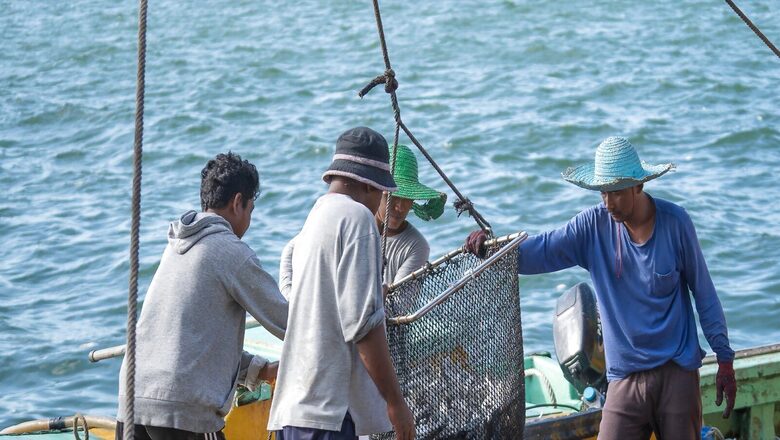
views
Two recent statements from the Centre may have a chilling effect on the Tamil Nadu government’s initiatives to minimise transgressions by Indian fishers into Sri Lankan waters. One is the Centre’s affidavit in the Supreme Court and the other is a parliamentary statement made by none other than External Affairs Minister (EAM) S Jaishankar, both on different aspects of the fishers’ issue.
Incidentally, Dr L Murugan, a native of Tamil Nadu, is the Union Minister of State in the Ministry of Fisheries, Animal Husbandry and Dairying, after the second Narendra Modi government sliced them away from the Agriculture Ministry, where they used to be departments for decades since Independence and badly needed the recast. The idea was to garner greater focus on marine development, issues and concerns, with fishing in specific focus. Incidentally, Murugan is also the Minister of State for Information and Broadcasting.
Ban ‘not justified’
In the Supreme Court affidavit in a pending case, the Union Fisheries Department, citing the report of an expert committee, submitted that the ban imposed by certain coastal states on the use of purse seine nets, or pair trawling, for fishing was not justified in the nation’s territorial waters (up to 12 nautical miles) and the EEZ.
The court was hearing a stay petition preferred by a Chennai-based NGO, ‘Fishermen Care’, against, a Madras High Court order, upholding the Tamil Nadu government order of 17 February 2020, banning large nets used to catch marine fish, under the amended Rule 17(7) of the state’s Maritime Fishing Regulation Rules. The case will come up for further hearing on 3 January, after the court’s winter vacation.
Purse seine nets are large and are spread across the sea, with pair-trawling from two trawlers at a distance from each other. It is not being used ordinarily by fishers in smaller motorboats. Thus far, these nets, because of their size when used on bottom-trawlers, are believed to be a threat to endangered maritime species, fish-ling and eggs, which it scoops out. The trawlers do their own share of destruction.
Based on such an understanding, states like Tamil Nadu, Kerala and Odisha have banned the nets, and so have the Union Territories of Puducherry, Dadra and Nagar Haveli, Daman and Diu, and the Andaman and Nicobar Islands. Citing the expert committee, which submitted its report on 15 November, the fisheries department has instead submitted that purse seine fishing “per se has not resulted in any serious resource-depletion so far, given the available evidence.”
It has recommended purse seiners to fish in territorial waters and the Indian Exclusive Economic Zone (EEZ) subject to certain conditions. The committee has also suggested the framing of a “national management plan on purse seine fisheries.”
Fish-size data
According to the affidavit, “This department agrees to the recommendation of the expert committee that a ban on purse seine fishing is not justified, and that the fishing may be allowed subject to certain stipulations.” Following this, the Bench headed by Justice AS Bopanna asked the Centre’s counsel to “secure instructions with regard to the stipulations that are referred to in the affidavit so that the same could be finalised by them, if they have not yet been finalised, before the fishing season comes to an end.
This follows the Centre submitting that it would take six months for it to formulate the national management plan and another six months for coastal states to devise an access plan (spatial as well as temporal), as recommended by the expert committee, which wants purse seine fishing restricted to specific months in the year.
Noting that the ban was imposed by states on the premise that the purse seiners undertake unsustainable fishing and garner a disproportionate share of the fish in the seas as compared to other classes of fishing vessels, the Centre said this could be resolved by making it compulsory for them to submit a “species-wise and fish-size data of their catch for each voyage undertaken… and to voluntarily reduce their fishing efforts to reduce conflicts”. This could be rolled out as an interim measure till the national management plan was finalised.
Sustainable fishing
It is all about what is internationally acknowledged as ‘sustainable fishing’ over a longer period. It is akin to the anticipated depletion of other natural resources like hydrocarbons and minerals, which however do not have a life of their own to procreate and grow in numbers. Instead, in this case, the ban is aimed at reckless fishing that kills non-fish marine species and also fish lings, as if there is no tomorrow for the trawler industry and no future generation of consumers.
Fishing in near-waters, maritime zone and EEZ are all mostly unregulated in the seas and whatever management that the expert committee suggests could be enforced only on the shores before the boats/trawlers take off. If nothing else, state governments cannot be expected to deploy the kind of resources that would be required for marine and maritime surveillance, checking and verification of species, which is what the expert panel recommends.
Yes, there are nations that are doing it already, but there are also nations that have banned bottom-trawling and purse seine nets in favour of what is called deep-sea fishing. In the Palk Bay where there is a live dispute between Indian fishers and their ‘umbilical cord brethren’ from Sri Lanka’s Tamil areas, even a well worked out management plan may fail on the ground. This is because the Palk Bay fishers on the Indian side using bottom trawlers and purse seine nets, are one-night-out fishers whose catch cannot be quantified or qualified at night, and stalling them at shore for verification by officials the next morning can render the catch non-consumable.
Going by media reports, there is no knowing if all states and union territories that have banned purse seine nets have been cited as respondents in the supreme court appeal, and their views have also been sought in the matter. Or, if the court would seek inputs from the Coast Guard and the Navy, which are alive to some of the issues — especially those pertaining those between Indian fishers and their counterparts in neighbouring nations — going beyond the obvious. This is because the restoration of purse seine nets, whether directed by the Centre (which states may still contest) or ordered by the court, could have long-term adversarial consequences that are not always predictable.
This apart, the expert committee’s suggestion that purse seine net fishers would practise voluntary restrictions, avoid conflicts and make voluntary disclosures on the catch-variety, even if on a temporary basis is a joke. The Tamil Nadu experience, on avoiding conflicts between the state’s artisanal fishers and trawlers has all along been in the negative. Citing the worn-out maxim that ‘fish no know political boundaries’, the trawlers in the state have also been violating every norm in the book.
Prima facie, the case relates only to the Tamil Nadu government’s ban and the Madras High Court verdict, but if the supreme court order quashes both, it will have application to all states and union territories. Herein lies the proverbial catch. The Tamil Nadu regulation was amended by the predecessor AIADMK government of chief minister Edappadi K Palaniswami, based on two factors. One, artisanal fishers and those deploying motor-boats in near-waters had been agitating for long wherever bottom-trawlers with purse seine nets were located. The chief minister even rewarded a woman official who seized purse seine nets in large numbers, including those that were being transported in trucks.
Sri Lankan conundrum
At least in the case of Tamil Nadu, the contested ban reportedly flowed from a persistent Central initiative spread over years to encourage the state government to curb or contain the use of purse seine nets and bottom trawlers. It was a part of an attempt to find an agreeable settlement to the larger issue of Sri Lankan fishers’ dispute. The crux of the matter is that Indian fishers, from Tamil Nadu’s southern coast and Karaikal enclave of the union territory of Puducherry, have been violating the invisible yet legalised ‘international maritime boundary line’ (IMBL) at will, to fish illegally in the Sri Lankan waters.
Oftentimes, the Sri Lanka Navy (SLN) arrest them, their vessels and fishing gear on the charges of violating the nation’s territorial waters, poaching thereof and also destroying fish habitats as the use of purse seine nets, they say, does precisely as much. Along a section of the southern Tamil Nadu coast, trawlers and even motorised boats are known to have destroyed marine habitats, including coral reefs that are part of the marine environment and ecology to make them all unsustainable.
For their part, Sri Lankan Tamil fishers from the North and the East have been staging periodic protests against the Indian fishers’ ways and waywardness, including the use of trawlers and purse seine nets. In written complaints to the Indian High Commission in Colombo and also the Consulate in the northern Jaffna town, they have listed out instances where speeding Indian trawlers had also torn off their smaller nets and toppled their smaller boats sailing at lower speeds.
It has been an unending saga for the two governments, leading to diplomatic interventions — thankfully, no instances — especially from the Indian side, to get arrested fishers and their boats released. There however have also been instances where Indian fishers have been killed, allegedly in shooting and other incidents involving the Sri Lanka Navy. Both arrests and deaths have constantly led to protests by and the possibility of future alienation by southern Tamil Nadu fishers.
Cultural problem
In context, NGO-facilitated fishers’ talks between the two countries, later sponsored by the Tamil Nadu government, and also government-to-government talks, including those at the ministerial and prime ministerial levels, have concluded that only a sustained ban on bottom-trawling and purse seine nets are a sine qua non can convince the Sri Lankan Tamil fishers to negotiate any cooperative arrangement, wherein governments, including that of Tamil Nadu, can only be facilitators, observers and enforcers.
The talks, including at the specially-constituted Joint Working Group (JWG) of the governments of India and Sri Lanka have also considered various options, including cooperative fishing, shared fishing, etc, but none of them seemed feasible while maintaining the status quo, especially when purse seine fishing is banned in Sri Lanka from the beginning. Again, at the instance of the Centre, the Tamil Nadu government has been implementing a funded scheme for fishers, especially in the troubled Rameswaram area, to convert their trawlers into long-liners for what is known as deep-sea fishing.
The slow progress of the project owes mainly to the boat-owners’ complaints regarding low subsidy compared to the cost of conversion or that of a new long-liner. International experts who had proposed a ‘buy-back’ arrangement for governments to take away trawlers from the fishers and replace them with heavily subsidised/funded long-liners have conceded that in specific instances, only five per cent of those trawlers did not return to those waters, or such other coastal waters of that nation.
In the case of Rameswaram fishers, there was also a ‘cultural issue’. For generations, they have fished only overnight. Deploying long-liners would mean that they would be spending a week or more in the deep seas, and not many fish workers find it comfortable or comforting. However, as experts claim, a bigger catch and larger profits — fish workers often get a share of the catch or its price for their wages in boats/trawlers owned by one among them or a third party — could encourage them to adapt themselves to deep-sea fishing.
For this to happen, they will also require storage facilities, marketing techniques and knowledge of international markets. The Centre and the state government, through their agencies, have promised the same, but it has not come to that as yet.
Politically-loaded
Alongside has come a related issue, in which External Affairs Minister (EAM) S Jaishankar told the Lok Sabha that Prime Minister Narendra Modi is in constant touch with the Sri Lankan President and Prime Minister on the question of freeing arrested Indian fishers early. “If fishermen apprehended in Sri Lanka are released today, it is not because someone is writing letters in Chennai but because someone in Delhi is taking up the matter,” Jaishankar said.
The reference is to successive chief ministers of Tamil Nadu, independent of their party affiliation, writing to the Prime Minister of the day, to intervene and obtain the early release of the state’s fishers and their boats, whenever arrested by the Sri Lanka Navy (SLN). While such instances might have come down in recent years, the fact that the Sri Lankan Parliament, through law in 2018, increased the penalties for the arrested fishers and trawlers, exponentially, has made it costly for Indian fishers (including those from Karaikal), more in terms of fines than in terms of discouraging them from crossing the IMBL.
For an erudite EAM with years of diplomatic experience at the highest levels behind him, Jaishankar understands that a state government in India can communicate/negotiate with foreign governments on such matters and others, only through the agency of the Union of India, headed by the Prime Minister. The alternative is for the state governments and chief ministers to take up the matter with the foreign government, Sri Lanka’s in this case, through informal, or formal channels, hopefully after keeping the Centre in the loop.
They have all desisted from doing so, with the hope and conviction that these subjects fall under the ‘Union List’ in the Seventh Schedule of the Constitution and that the Centre would protect the state’s interests and address its concerns, and those of the Indian national under its immediate care, in times of such difficulties. In this background, the minister’s politically-loaded statement, possibly aimed at Tamil Nadu’s incumbent DMK chief minister M K Stalin, seems to be in bad taste.
Tail-piece: The twin issues have cropped up at a time when India and Sri Lanka have agreed to recommence the Karaikal-Kankesanthurai ferry service. The ferry service is relatively low cost ($60), compared to the revived Jaffna-Chennai air-fare ($112 appx) is expected to boost tourism and bilateral trade, especially between Tamil Nadu and Sri Lanka’s Tamil north, and when there’s continuous and at times coordinated hauls of drugs meant for the national/international market. Recently, the National Investigation Agency (NIA) arrested nine inmates of a special camp for Sri Lankan Tamil refugees in Tiruchi, Tamil Nadu, for large-scale drug smuggling and attempts to revive the dreaded LTTE, which is banned in both countries as a ‘terrorist organisation’.
The writer is a Chennai-based policy analyst & political commentator. Views expressed are personal.
Read all the Latest Opinions here



















Comments
0 comment